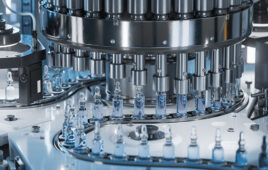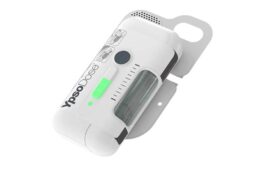 Startup BioNanoTech has developed a patented platform technology for purifying proteins/antibodies across size ranges.
Startup BioNanoTech has developed a patented platform technology for purifying proteins/antibodies across size ranges.
In particular, the company has developed a new class of Immobilization Metal Affinity Chromatography (IMAC) nanoresins.
“We are building something new at a new scale, and something that can do chemistry and physics on a scale that is more closely to what the target molecules are,” said John Harrold, chief scientific officer at BioNanoTech.

Onyema Osuagwu
While IMAC has existed for more than four decades, the technology traditionally has not been able to capture a wide range of proteins. “This is problematic because these are the starting points for what will be coming later on biologic drugs,” BioNanoTech CEO Onyema Osuagwu said.
Traditional drawbacks of IMAC include metal-ion leaching, size-variant protein capacity and denaturation of some proteins.
BioNanoTech has developed a new class of patented IMAC nanoresins to overcome those hurdles. The company says its resins offer reduced or no metal leaching and size-invariant protein capacity.

John Harrold
“We’ve nano-engineered a new type of support for our platform that gives us that ability to deploy IMAC resins and other technologies that we’re also developing,” Osuagwu said.
In addition to IMAC resins, the company has also developed immunoaffinity chromatography (IAC) nanoresins that offer similar advantages in the purification of monoclonal antibodies. The IAC resins also support high capacity and purity.
The company says its new resins also offer high purity in a single-step separation of cytosolic and membrane proteins with less denaturing than current technologies.
BioNanoTech is targeting customers across the biotech sector, including R&D scientists in the pharmaceutical industry and academia.
“The first and most important thing is workflow reduction,” Osuagwu said. “Because we have so much higher purity and much more specificity in how we set it up, we can reduce steps.”
“The step reduction is powerful — especially in the R&D phase,” Osuagwu added. “We’ve gotten a lot of good commentary on that.”
Another factor differentiating BioNanoTech in drug discovery is its focus on physics. “We’re working with something that is more on the scale of biomolecules. And our materials are on the same scale, which means that the physics gets a lot more involved than, say, something like the ensemble effects of chemistry,” Harrold said.
BioNanoTech has secured funding twice from the National Science Foundation (NSF). In addition, the company is a recipient of I-Corps NSF funding. It has also received financial backing from the Small Business Innovation Research (SBIR) program.
“We actually were very intentional about where we took dollars,” Osuagwu said. “In addition to being able to help the widest number of people, we wanted to exert some level of control so we can understand the intentions of those we partner with.”
Filed Under: Drug Discovery and Development





Tell Us What You Think!
You must be logged in to post a comment.